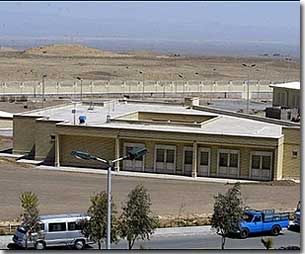| Home / International | Tools: Save | Print | E-mail | Most Read |
| IAEA Inspectors Install Cameras at Iran's Natanz Nuke Complex |
| Adjust font size: |
An informed Iranian nuclear official said Friday that inspectors from the International Atomic Energy Agency (IAEA) had already installed cameras at the country's Natanz nuclear complex, the official IRNA news agency reported.
A general view shows the Iranian nuclear power plant of Natanz, 270 kms south of Tehran in 2005. The cameras have been installed "in accordance with Iran's commitments towards IAEA regrading the UN nuclear watchdog's inspection and control responsibilities," the official told IRNA reporters. Referring to some Western media's reports that Tehran has blocked entry of IAEA inspectors to Natanz plant, the official termed it as "unprofessional", saying "Iran has not imposed any restrictions against IAEA inspectors' activities." "Such news are baseless and just aimed at disturbing and inflicting distractions in the course of Iran-IAEA cooperation, Iran's officials have cooperated with the inspectors thoroughly in the past week," he added. The official also reiterated Iran's dissatisfaction with the previous IAEA inspectors, saying "in recent months we have witnessed the unprofessional conduct of the people that introduce themselves as diplomatic sources and seem to have no other job, save for disturbing the process of Iran-IAEA cooperation." "Not only Iran, but also IAEA officials have opposed such sick process," he added. Last month, Iran banned 38 IAEA inspectors to enter the country, and accused them of "unprofessional and illegal" activities during their inspections at Iran's nuclear sites. The Islamic Republic, however, has also promised that Tehran was fully cooperating with the IAEA within the Non-Proliferation Treaty (NPT) on inspection and safeguards supervision, adding the cooperation would continue. Under the agreement with the Iranian authorities, the IAEA regularly took snap inspections on the country's nuclear sites in the past year. Since Tehran's relations with the West has exacerbated due to the nuclear disputes last year, the Iranian authorities has started to limit the visit to the country's nuclear sites by inspectors from the UN nuclear watchdog. The UN Security Council passed the Resolution 1737 on Dec. 23, 2006, calling on Tehran to suspend its enrichment activities while imposing sanctions on Iran's nuclear and missile programs. However, Iran rejected the resolution and vowed to install at least 3,000 centrifuges by the end of March. On Dec. 27, the Iranian parliament passed a bill obliging the government to reduce its cooperation with the UN nuclear agency, which was approved by the powerful Guardians Council immediately and formally became a law. (Xinhua News Agency February 3, 2007) |
| Tools: Save | Print | E-mail | Most Read |
 |
| Related Stories |
| China Calls for Early Iran Nuke Talks |
| Iran Feeds Gas into 2nd Cascade of Centrifuges |
| Rice: Time Running Out for Iran's Nuke Issue |
 |
 |
|
 |
| Links |
